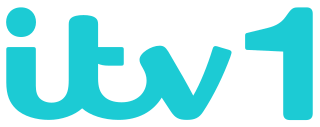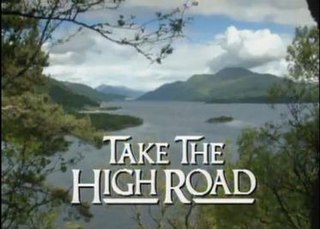
ITV, legally known as Channel 3, is a British free-to-air public broadcast television network. It is branded as ITV1 in most of the UK except for central and northern Scotland, where it is branded as STV. It was launched in 1955 as Independent Television to provide competition and reduce the current monopoly to the then BBC Television. ITV is the oldest commercial network in the UK. Since the passing of the Broadcasting Act 1990, it has been legally known as Channel 3 to distinguish it from the other analogue channels at the time: BBC1, BBC2 and Channel 4.

Scottish Television is the ITV network franchisee for Central Scotland. The channel — the largest of the three ITV franchises in Scotland — has been in operation since 31 August 1957 and is the second-oldest franchise holder in the UK that is still active.

Take the High Road was a Scottish soap opera produced by Scottish Television, which started in February 1980 as an ITV daytime programme, and was broadcast until 2003. It was set in the fictional village of Glendarroch, and exteriors were filmed in the real-life village of Luss on the banks of Loch Lomond.

Scotsport is a Scottish sports television programme, broadcast on STV in northern and central Scotland between 1957 and 2008, as well as on ITV Border in southern Scotland.

Lorraine Smith is a Scottish television presenter. She has presented various television shows for ITV and STV, including Good Morning Britain (1988–1992), GMTV (1993–2010), This Morning, Daybreak (2012–2014), The Sun Military Awards (2016–present), STV Children's Appeal (2016–present), and her eponymous programme Lorraine (2010–present).
Arthur Montford was a Scottish Television sports journalist, best known for his 32-year tenure as the presenter of Scottish Television's Scotsport. Although he was most associated with football, he covered a number of other sports for ITV, notably golf.
ITV Nightscreen was a scheduled programme on the ITV television network, consisting of a sequence of animated pages of information about ITV's upcoming programmes, features and special events, with easy listening music in the background. The programme was used to fill the station's overnight downtime, where a closedown would have once been used at the end of programmes. The programme was generally shown seven days a week with the typical weekday show airing from 4:05 am to 5:05 am daily. However, on ITV's digital channels, the amount of Teleshopping affects how much Nightscreen is broadcast. The programme was also broadcast on all of ITV's +1 channels.
Television in Scotland mostly consists of UK-wide broadcasts, with regional variations at different times which are specific to Scotland. The BBC and ITV networks both began broadcasting in the country during the 1950s. There were further expansions in the early 1960s with the arrival of Grampian, Border and BBC2 television.

World of Sport is a British television sport programme which ran on ITV between 2 January 1965 and 28 September 1985 in competition with the BBC's Grandstand. Like Grandstand, the programme ran throughout Saturday afternoon.

Scotland Today was a Scottish regional news programme covering Central Scotland, produced by STV Central. Despite its name suggesting a national remit, the programme was actually limited to stories around STV's Central Belt franchise. North Tonight covered STV's North Scotland region, until both programmes were renamed STV News at Six in March 2009.
Night Network, Night Time and Night Shift were names given to the overnight schedule of the ITV network in the United Kingdom. The first ITV company began 24-hour broadcasting in 1986, with all of the companies broadcasting through the night by the end of 1988. At first, individual companies created their own services; however, before too long, many of the smaller ITV stations began simulcasting or networking services from others.

STV is a free-to-air public broadcast television channel owned and operated by the STV Group. It is made up of the Central Scotland and Northern Scotland ITV public broadcaster licences, formerly known as Scottish Television and Grampian Television respectively.

The Hour is a lifestyle magazine programme that was broadcast on STV, the ITV franchise in Northern and Central Scotland, premiering on 26 May 2009. Originally broadcast each weekday afternoon at 5pm, the programme was presented for much of its run by Michelle McManus and Stephen Jardine and broadcast from STV's Pacific Quay studios in Glasgow. The programme moved to a weekly peak time slot in September 2011, but was cancelled in October 2011.

STV Group plc is a media company based in Glasgow, Scotland. Beginning as a television broadcaster in 1957, the company expanded into newspapers, advertising and radio; after completing a restructuring in 2010, STV Group is active in broadcast television, video-on-demand and television production. The company is a constituent of the FTSE SmallCap Index.
This is a timeline of the history of the British television network ITV.
This is a timeline of the history of the British broadcaster Scottish Television. It provides the ITV network service for Central Scotland.
This is a timeline of the British company ITV Digital Channels and its predecessors Granada Sky Broadcasting and Carlton Communications, and digital channels of other ITV-related companies. The timeline does not include events related to ITV network's flagship channel.
This is a timeline of the history of rugby union on television in the UK.
This is a timeline of overnight television broadcasting in the United Kingdom. It focuses on programming between midnight and 6am and includes details of when channels began into the night and 24-hour broadcasting.







